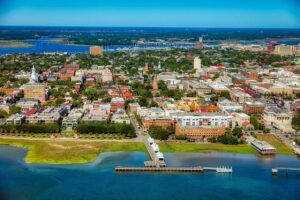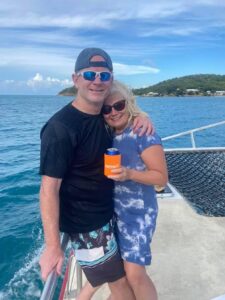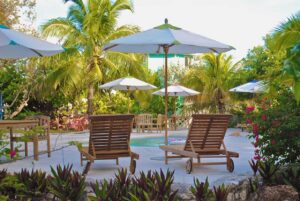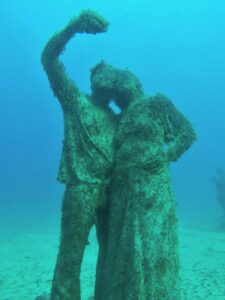Days after returning from a trip to Kodiak Island, Alaska, I experienced an uncontrollable urge to stop the car whenever I glimpsed something red in the bushes along the side of the road. This curious habit developed because of the little raspberry-like, orange-colored salmonberry. We found our first of these miniature grape-shaped globes while hiking an easy mile-long trail at North End Park on Near Island, across from the town of Kodiak.
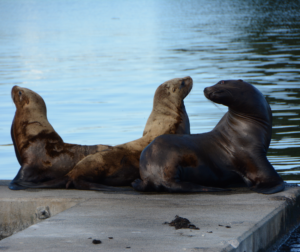
It was love at first bite. The texture of these wild berries is seedy, yet the flavor succulently sweet tart. The rest of our stay, both on Kodiak and along the offshore islands where we cruised, I competed with local bears for my fill of this fruit — thankfully not at the same time. Salmonberries, however addictive, were only one highlight of our trip.
Kodiak is the second-largest island in the United States, measuring more than 3,500 square miles, and its subarctic climate makes cruising a seasonal adventure best undertaken in the summer. We arrived in late June via a 3.5-hour flight from Seattle to Anchorage, then took a 50-minute commuter hop south across the Kenai Peninsula to Kodiak.
The trip ticked two boxes: first, a chance to visit our son Rian stationed on a U.S. Coast Guard cutter at base Kodiak. Second, it proved an opportunity to spend time cruising with a friend who motored the family’s 58-foot trawler north through the Pacific Northwest’s scenic Inside Passage and across the Gulf of Alaska to Kodiak Island.
We met our friend on the dock at St. Paul Harbor Marina in downtown Kodiak. This town, population just under 6,000, is the main port and largest settlement on the island. Between the city-run marina at St. Paul Harbor and its neighbor, St. Herman Harbor on Near Island, you find dockage for more than 600 vessels. Most are powerboats, but many are commercial fishing rigs, including the stars of the Discovery Channel’s reality show, The Deadliest Catch.
The docks offer a central vantage point to get the lay of the land. To the immediate north is a line of sturdy albeit quaint homes that line the main two-lane waterfront road. Behind them to the west, rising some 1,240 feet is Pillar Mountain, where wind turbines power residential lights and the commercial fish processing plant, the town’s main industry. West too in the distance is Barometer Mountain, some 700 feet taller than Pillar and even in late June is still capped in snow. The Gulf of Alaska extends far to the south. To the immediate east rises the cross-topped, blue dome of the Russian Orthodox Church with the eastern part of the island and several offshore islands beyond. My favorite sight, and right near the marina’s entrance, were a group of sunbathing sea lions congregated on a concrete pier. Despite these defining landmarks, Kodiak, both town and country, is compelling for its hands-down wilderness vibe. This is something we couldn’t wait to explore.
Kodiak is located on the northeast corner of the island. We cast off from St. Paul Harbor Marina and headed east, following the island’s coast. Then we turned north and cruised through Narrow Strait, which separates the east end of Kodiak from Spruce Island. Occasionally, we would see signs of civilization such as a seasonal commercial fishing camp, a simple structure or two, and work boats dotting the shore.
Soon we came to the village of Ouzinkie, 14 nautical miles from Kodiak and the only settlement on Spruce Island. Like most ports outside Kodiak, there are no shops, bars, restaurants or other visitor services except for residents with local knowledge ready to lead a fishing excursion or hiking trip. As we cruised by a small beach, I saw a little girl clad in a bathing suit playing in the water as her mother watched nearby. In contrast, I was outfitted in corduroy slacks, a long sleeve shirt and warm sweatshirt. The scene reminded me it was summer in Alaska.
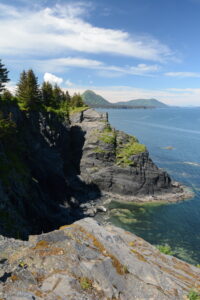
The bow pointed north as we cruised into Marmot Bay towards Afognak Island. The protection of the strait was like a warm blanket whipped away as the breeze braced and temperatures dropped despite the bright sun. Later in the week, we came back here on a day-long charter fishing trip and reeled in a whole fish box worth of species such as halibut, salmon, lingcod, pacific cod, yelloweye and rockfish. The processor on the island cleaned, packed and froze our catch so we could fly home with it.
On this day, however, we were after bear. Kodiak bear. As the largest bears in the world, adults stand over 10-feet tall and weigh up to 1,500 pounds. It wasn’t long after we entered the mouth of the Afognak Bay, some 12 nautical miles from Ouzinkie, that we bagged a bear sighting. A big momma had a cub in tow, and they were in a salmonberry patch just up from the rocky shoreline. We slowly motored, following the deserted bay inland and ate a late lunch like the bears.
Earlier that morning, I had stopped by the Monk’s Rock Coffeehouse & Bookstore in Kodiak, grabbed fresh coffees from house-roasted beans and a selection of ham and swiss, turkey and smoked Alaskan salmon sandwiches to go. I also grabbed a half dozen of Monk’s Rock’s signature glazed chocolate and maple donuts for breakfast on board the following morning.
That night, after cruising west about 10 nautical miles, keeping Whale Island to our south, we anchored in a rare sandy bay about 400 yards off a gravel beach at the southeast end of uninhabited Little Raspberry Island. With the nearest humans at an isolated fishing lodge on Raspberry Island five to six miles away, this was the earthly epitome of what we now call social distancing.
The heavens were in bright view, with no manmade light to dull the brilliance of the constellations. The only caveat was that the best sky-watching time occurred between midnight and 3:00 a.m., because in late June Kodiak enjoys about 18 hours of daylight.
The next day, we motored 14 nautical miles south to Anton Larsen Bay, back on Kodiak Island. Residents of the nearby settlement of Port Lions often use the boat launch and dock when they need to buy groceries and other supplies in Kodiak. Our friend dinghied us into shore, and we said our goodbyes.
Our son picked us up and led us on an easy five-mile loop trail hike that traversed dense forests, grassy stretches dotted with purple lupine wildflowers and overlooks with dazzling views of the bay. Two days at sea followed by a hike ashore proved a perfect juxtaposition. We felt like we experienced the real Kodiak. Best of all, we found plenty of salmonberries along the way.


